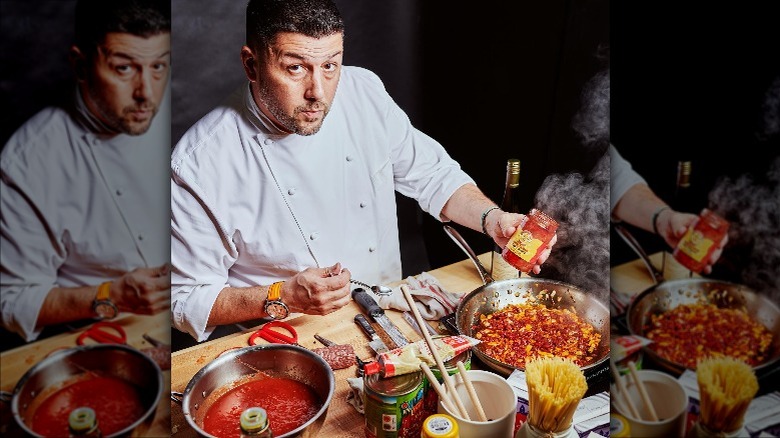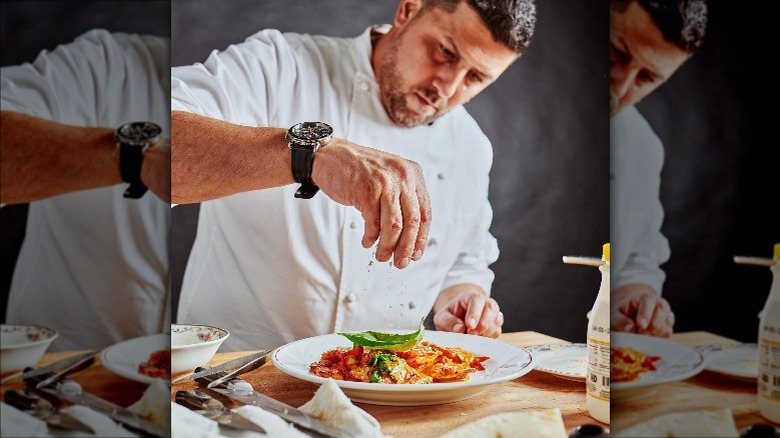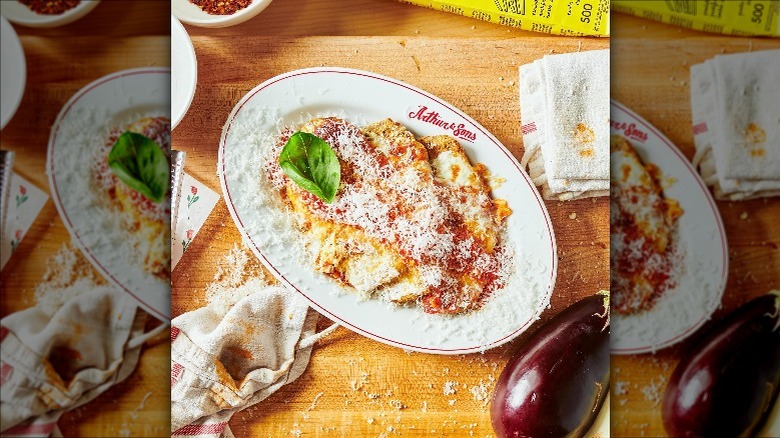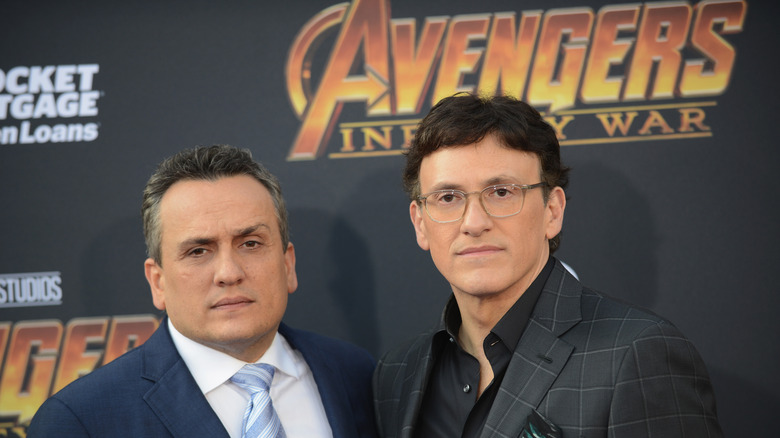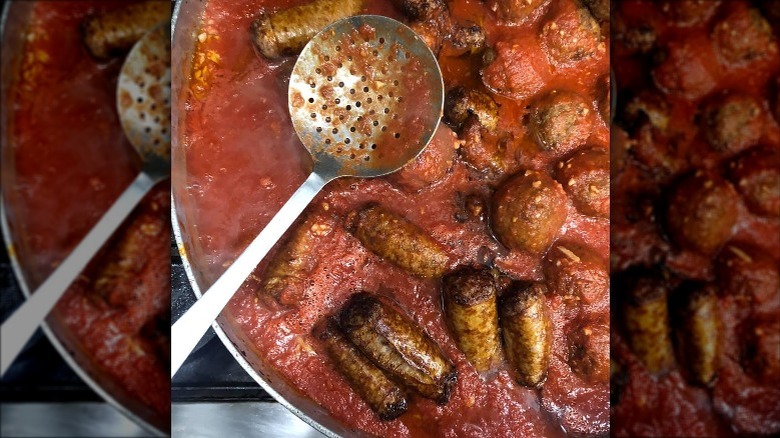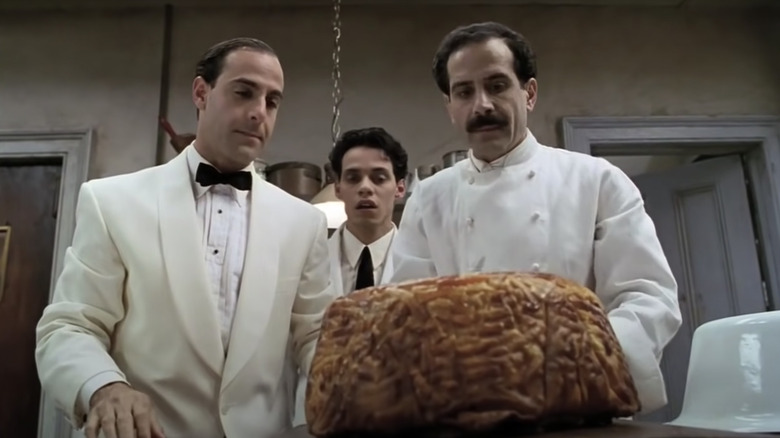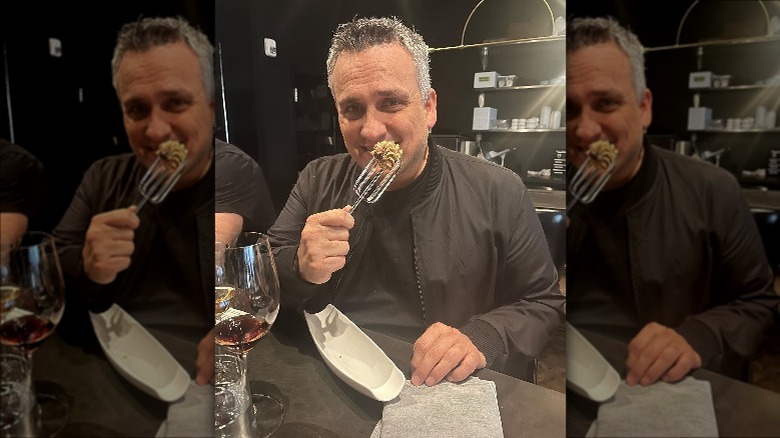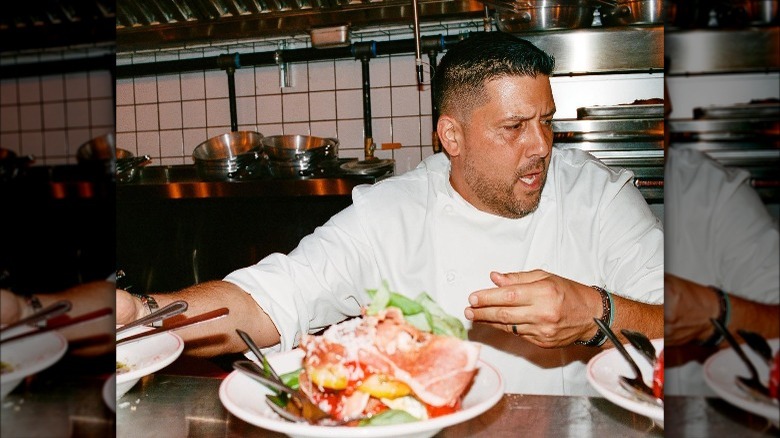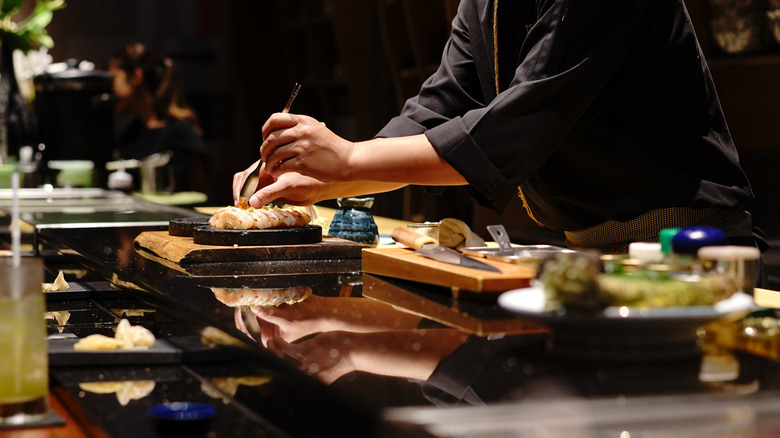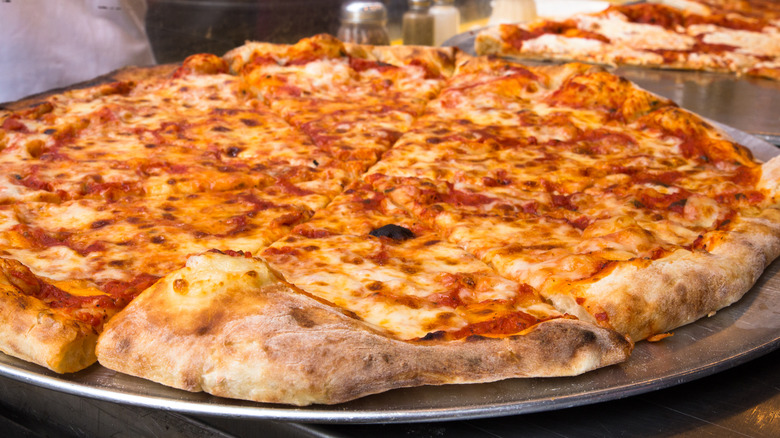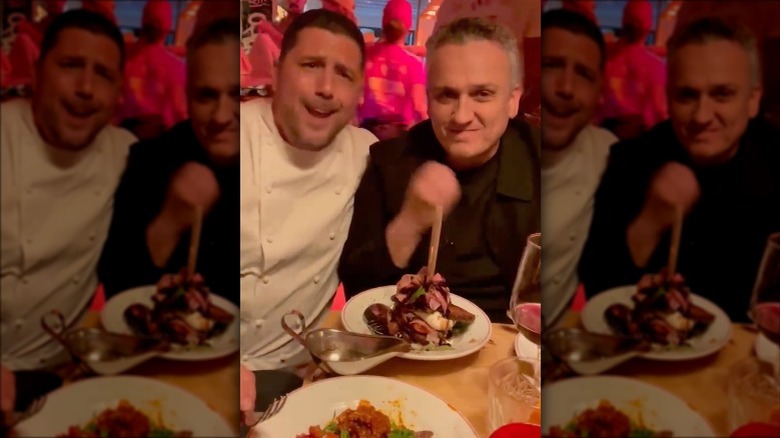Joe Russo And Joe Isidori On Film And Food - Shared Tastes
At first glance, you might think Joe Russo and Joe Isidori share nothing more than a name. The former Joe is the award-winning co-director of several Marvel movies, including the box office blowout, "The Avengers: Endgame." The latter is an acclaimed Michelin star chef, cookbook author, and owner of the New York City hotspot, Arthur and Sons. But when we got the two together, it quickly became clear that they were kindred spirits with a proud Italian heritage and an equal measure of dedication and passion for their crafts.
As it turns out, leading a restaurant and running a film set aren't too different in a lot of ways, and both of these Joes have their family's culinary traditions to thank for leading them to the spectacular careers they have today.
In the first episode of "Shared Tastes," exclusively from Tasting Table, Russo and Isidori came together to talk all things Italian food, discovering how much they have in common, from their similar upbringings to their love of storytelling through their craft. The two also revealed their favorite desert Island meals, joked about trading places in the kitchen and on set, and made some plans for future restaurant endeavors that we can only hope are at least slightly serious.
Joe Isidori opens up about growing up in the kitchen
Joe Russo: Hi, I'm Joe Russo.
Joe Isidori: The legendary director of "The Avengers" and many other great movies. I'm Joe Isidori, the other Joe.
Russo: Joe is the owner of Arthur & Sons in New York, one of my favorite restaurants in New York City.
Isidori: I've had the pleasure of dining with him in my establishment. He's a great friend. I love breaking bread with him, and I'm excited to be here to chat about my life and his life together.
Russo: And food.
Isidori: And food, yes.
Russo: Joe, I want to ask you about your upbringing, because food was a really important part of it. I want people to understand that emotional backstory behind Arthur & Sons and what it means to you and how you came to the name for the restaurant and the style of cooking that's in the restaurant. Tell me a little bit about when did you fall in love with food?
Isidori: I can't pinpoint that. I was born into this. I'm a third generation chef. I don't know anything else, and I wasn't given the opportunity to learn anything else. At the end of the day, my father said, "Some people lay brick, some people fix shoes. We cook. Get in the kitchen." I fought it a little bit when I was a kid growing up in New York. I was like, "I want to be an artist. I want to do this. I want that," and he said, "Knock it off. Chicken Parmesan pays the bills. Don't forget it. Get in the kitchen."
I've been in the kitchen my whole life, and it used to feel like a little bit of purgatory for a while. My mother would come home and say, "Joseph's being bad again. You need to punish him." He goes, "I know what to do. Get in the kitchen. Clean a hundred pounds of galamad [calamari], clean a hundred pounds of shrimp, a hundred pounds of [mussels]."
I'd go in the kitchen, boom, boom, boom, boom, real fast. Finally, he'd go to my mother and go, "I don't know how to punish him anymore. He's getting pretty good at this." It got to a point where it was natural.
Russo: I love that punishment turned into your career.
Isidori: Yes. My punishment turned into my career.
Russo: Your family pushed you into your 10,000 hours, right?
Isidori: That's right.
Isidori says family loyalty evolved into a lifelong passion for cooking
Russo: You became an expert because it was part of the family business. In a lot of ways, like you said, you feel like you're forced into it and then you pushed it inside yourself and turned it into your art and found a personal reason to do it, right?
Isidori: I did. When I first started cooking, I was just putting food on a plate. A chef only cares about the food. I got to know Gordon Ramsay as I was older, and he said to me [and] others, "You know what the difference between [two and three Michelin stars] is?" I said, "What?" He goes, "Two stars, you can win on the food. Three stars, the entire restaurant is in control by the chef." That motivated me to say, "I don't necessarily want to be a three star Michelin restaurant, but as soon as you walk in my restaurant, I need you to feel me and who I am and what my style is."
Russo: Which is what's amazing about Arthur & Sons. That's why I love it so much, because when you come in there, it is so clearly your personality. You are pervasive in every aspect of the restaurant, from being greeted at the door with the cocktails, to the menu, to you coming to tables and talking to people, to the energy, to the music. In a lot of ways, I feel like I'm in your basement bedroom when you were 16 years old, listening to your soundtrack, eating your food, drinking what you would drink, and having the experience that you would want to have in a restaurant.
Isidori: You've absolutely experienced that. There's no better person to talk about it than you. I'm in the middle of service right now. I had to run upstairs to take this interview with you. I smell like fried galamad right now. The music's pumping downstairs. I probably table hopped 10 tables before I came here. "Hey, how you doing, Joe?" This and that, and here we are. You've experienced that.
The art of telling stories through food
Russo: Let me ask you this question because I deal with audiences all the time as a storyteller. You tell a story to the folks in your restaurant every night. You tell it through food, you tell it through your personality, you go table to table. You just told me earlier, you went to 10 tables before you came up here to do this interview. Why is that important to you? Why is that connection to your customers so important to you?
Isidori: It's a great question. When I was younger, when I was cooking on the line, I was always more interested in ... I wasn't so interested in how I cooked the dish. I was interested in the gestalt of everything. To me, it was more interesting to find out what was going on outside and hear people's feedback and interact with them. I trained myself in a way where I could be a little bit more of a maestro, as they would say, and be able to pull the strings from anywhere in the restaurant. Engaging with the customer was my way of differentiating myself from other restaurants.
Veal Parmesan is everywhere. Ravioli is everywhere. What's different about the veal Parmesan at that restaurant or that restaurant? In my restaurant, it's me. It's my personality. It's the story I tell. When you bite into that food, it could be the same dish, but it will taste different. It will feel different and it will give you a different experience. It's very important for me, back to that Gordon Ramsay statement I made, to make sure that I control every aspect of the restaurant to make sure that my veal parm is better than the other guy's veal parm. The only way to do that is with me.
Russo: That's right. The reason I love going to your restaurant so much is for you. The food's amazing, but what you bring to it — the time I spend talking to you at the table reminds me of when I was younger, and the time I would spend with my family and the way we would share food and laugh. You come out and your energy is infectious, and your knowledge about what you're making and the care with which you present it to everyone. It's the one meal, and I brought a lot of my friends, we came up, we were working hard, we're working on a movie. We came up together just to go to the restaurant because I'd heard so much about it.
Isidori: I have goosebumps thinking about it.
Russo: We all still talk about it, and this was six, seven months ago. We all still talk about that meal, and it's because of what you brought to it. That's a special part of food, that personality and your connection to an audience.
The Italian ethos is about making people happy, in the kitchen or on the big screen
Isidori: It's the same way as you tell a story, too. You do the same thing through your own medium, [and that's] why people hang on the edge of their seats watching your movies for hours and hours, and then they watch it over and over again. We're both doing the same thing. We're both Italian Americans from Gridiron Italian communities that took our passions and our mediums and used it to our abilities to tell stories and make people happy.
We're people pleasers. That's all we are. I'm not brilliant. You're not brilliant. We're people pleasers and we do everything in our power to make people happy. You do it with your movies. I do with my food. There's a lot of similarities and crossover, but at the end of the day, we're both Italian Americans. Family is number one, and making sure people are happy is also number one.
Russo: Trying to recreate the feeling that I had as a kid, sharing things with people I loved, that's why we tell those stories. There's a level of inclusion. I want people to come in under the tent together and to share in something. It's what we love so much about making those Marvel movies. You go look at the videos from the audiences and the way that they reacted to "Infinity War" and "Endgame." We could have never done anything better than that in our careers than what happened in those moments, in those theaters, with people together all over the world.
It doesn't matter who you are — race, creed, color, doesn't matter whether you're blue or red. You're in that theater together, sharing in that story, in that moment. It's an incredible way to include people and to build bridges between people, because they're celebrating something that they collectively love together. Food can do the same thing. It brings people together.
Isidori: Absolutely. I still remember getting off work and buying that midnight ticket to "Endgame" and calling my wife and saying, "I'm not coming home. I'm not going to a bar. I'm not hanging out with my cooks. I'm going to go to the movie theater alone with a box of popcorn and watching 'The Avengers.'"
Russo: What time did you get out of there? 3:00 in the morning?
Isidori: Yeah. I loved it. I remember walking down First Avenue or Second Avenue back to my house. It was like 3:30 in the morning. Nobody was out. I felt great after watching that movie.
Russo: How was your theater? Was it crowded?
Isidori: It was, but it was comfortably crowded. It was one of those places where you could get a drink, too, so it was even better.
Russo: Yes, that's good.
Isidori: Pilgrimaging after a hard night's work by myself to watch your movie is just like you saying to the crew, "Get on a jet. Let's go. We're going to go eat with Joe." I'm very proud that you did that for me, and I'm honored that I was able to go and watch your movie alone and at midnight after a hard night's work and have one of the best nights ever. My wife wishes she was there, but I told her, "This is a Marvel movie, let me be."
Russo: It's a private experience for me.
Isidori: That's it. Let me be. I'm sure that you have a similar story, maybe not pushed into it the way I was, but in the end, we're both relaying a message as creatives, as people that produce things and provide a memorable experience.
How cooking influenced Joe Russo's film career
Isidoria: How about yourself? Did you grow up thinking you were going to become one of the most famous directors in the world?
Russo: No, not at all. I grew up in a duplex in Cleveland, Ohio on 127th Street in Woodland. It was me and my brother and my sister and my parents, and my great-grandmother lived downstairs from us. She would cook every Sunday. You could smell it coming up through the floorboards, and she'd probably start prepping on Saturday. She'd start cooking at 7:00 a.m. so you'd wake up smelling it. The whole family would come over and eat, and by whole family, I mean 20, 25, 30 people would come squeeze into her apartment.
We'd all sit around a table and eat together, and we'd tell stories to one another about what happened during the week. The most entertaining people would tell the longest story. That's where I really learned how to tell stories, sitting around a table with my family, sharing her food.
There's a great recipe, a very simple recipe in "The Godfather" when he talks about how to make Sunday gravy, where it's a little bit of oil, you fry up some garlic, you throw in your tomato and your tomato paste, and you put in your sausage and your meatballs. That's exactly how she used to do it, and it's exactly how I make it — very simple. I don't like onions in it.
Isidori: That's how I do it.
Russo: That's it — just garlic, some sauce, a little bit of sugar if you aren't using sweetened tomato sauce. We started as storytellers around a table sharing food with my family. Then, slowly over time, it evolved. I became a writer. I started writing when I was in high school. I went to the University of Iowa to study English and writing. Then I got into acting. I got an MFA in acting. Everything was pursuing storytelling in some capacity.
Then, I made a decision to transition to being a director because I didn't like acting. I didn't want to have a career where I was waiting around for somebody to tell me I have a job. I want to go create my own job. That's my trajectory in how food was a very important part of me becoming a filmmaker.
Lessons on life and cooking from 'Big Night'
Russo: Tell me a little bit. We both love movies. Do you have a favorite scene in the movie that involves food? I know I brought up "The Godfather."
Isidori: I do, and it's more of a chef answer. You got all those movies out there about chefs, and there's only two that I really gravitate to. One is "The Big Night." My father and I used to watch it all the time, and it's such a life lesson to learn as a chef. You sit there and he made a perfect risotto, and he would make it every day, and he would look into his dining room and there was nobody there. He didn't understand why I make the perfect risotto and nobody's here. His brother came and he said, "Louis Prima's coming, and it's going to change everything." It's kind of like Joe Russo coming to the restaurant.
I remember this angst in the movie of their whole lives depending on this one person coming to taste the risotto. In walks the guy from across the street who my father would affectionately say is the schoombari guy, the guy across the street. He's serving burnt well done steaks and french fries, and he had a line out the door — fancy cars, people swing dancing, and everyone would be so frustrated. "Look at this guy, he's serving crap, he doesn't care, and he's packed and he's rich."
It's a life lesson because at the end of the day, it's so true. You know how many Michelin star restaurants I had where I would sit there and scratch my head and say, "I have Michelin stars and my bank account is empty, and there's nobody in my restaurant." It was baffling.
My father would say to me, "Joseph, it ain't about foie gras oysters. It's about finding your chicken Parmesan. Chicken Parmesan pays the bills. Your problem is you got a champagne taste on a Budweiser budget. Find your chicken Parmesan, be happy. Go out there, take care of yourself and your family." I've always lived by that mantra. It's not about being the screw buddy guy, and it's not about being the brothers that say, "I want to make the perfect risotto." It's about being somewhere in the middle. That's one of my favorite stories to tell.
Russo: What's that special pie they make at the end of "Big Night?"
Isidori: Was it Timpano?
Russo: Timpano. That's right.
Isidori: With the pasta and everything.
Russo: Have you ever made a Timpano?
Isidori: I got to be honest, I never have.
Russo: Can you make one for me next time I come to Arthur?
Isidori: I can. I absolutely will, and it'll be my first time and we'll film it and we'll see if it's a winner or a loser. If worse comes to worst, we'll have a really good baked ziti.
Russo says good food helps fuel all of his films
Russo: There's a joint in Atlanta called Storico Fresco. Once a week, [they[ make a Timpano. We would send one of the [production assistants] up there to get it, and then we'd cut it up and serve it to the crew. Food is really important on our sets. It's either, "What's the pizza in the city that we're in?" or "What's the best Italian food we can find?" every Friday — the crew is so obsessed with food. It's part of our requirement to work on a Russo Brothers movie: you got to love food or you can't work on the movie.
We take requests from people. We'll bring in food from someone's favorite restaurant once a week on a Friday, and everybody gets to talk about it. We all share it together.
It's just like when we were kids with our grandma, our Nona, and we celebrate and laugh and share stories about the week around the food on set. Our work family is as important to us as our real family, because we spend so much time with them. It's that emotional connection we have to eating and the sharing. We try to bring that to set every day.
How directing a film is like running a restaurant kitchen
Russo: If you and I were to trade places, how do you think you would do on a set as a director?
Isidori: I think I'd be pretty good.
Russo: I think so too.
Isidori: I could hold my own. I'd make some mistakes, but I would rally the troops. I'd create culture, I'd listen to others, and I'd do everything I could to make a great movie.
Russo: You've been running kitchens for years. You've been running restaurants. All filmmaking is, all directing is, is making decisions efficiently, making quick decisions. I always tell young directors, "You got to make a decision and be confident and make it. If it turns out you made the wrong decision, figure out how to make it the right decision." That's all your job is. Everything's coming at you. Thousands of questions all day long. Yes, no, yes, no, do this, do that. Try that, try this. You're not going to hit on all of them, but when they come back at you for a [problem to] solve, be ready, be confident, and come up with the solve and move on.
Isidori: I tell everyone, keep making decisions until you make the right decision.
Russo: That's right.
Isidori: That's all you need to know.
Russo: We both have very similar philosophies. How would I do in a kitchen? How do you think I'd do in the kitchen?
Isidori: Tell me. I want to know. Can you take the heat of the kitchen?
Russo: I was a cook for about two years when I was 19 and 20 at an Italian restaurant in Cleveland that we actually used in the movie "Cherry." We went back years later and shot at this restaurant [where] I was a cook. I don't have a ton of moves. I make a good sauce that I learned from my grandma, from my Nona, and I make a decent veal cutlet. I make a decent breaded chicken with a butter sauce and some capers, but I don't have a ton — a good salad. I've got a very small roster of things I can do, but I don't have your skillset for –
Isidori: You sound like you're doing fine. I'm coming over to eat, by the way. You just wrote the menu. I'm on my way. The cutlet with the capers and the salad, you had me at capers. I'm in.
Russo: Okay, good. I do a little anchovy paste dressing. That's my thing.
Isidori: Oh, come on, let's go. Don't forget the bread. Bring the wine. As they say, now we can eat. Let's go. I'm in.
Russo and Isidori talk trading places
Russo: I'm trying to think, Joe, your personality is so amazing, what I would cast you as in a movie. What would you want to be cast as in a movie?
Isidori: I have no idea. I can't even answer that question. That's all on you, but listen, the old adage, "Hey coach, put me in." That's all I need to know, and I will deliver. If you worked in a restaurant, do you want to be the chef? What role would you want to be?
Russo: There's a lot of pressure being a chef, right? It's also what kind of restaurant too, right? That takes a lot of thought.
Isidori: Let's back the question up. What kind of restaurant would you want to work at or be in, and what role would you like to play?
Russo: Weird answer: The obvious answer is Italian, which of course I'd love to, but I love the attention to detail and the camaraderie in a great sushi restaurant between the sushi chefs and the discipline and their connection to the customer when they're sitting there at the counter. If I'm not eating Italian, I'm eating sushi. That's a great experience in a restaurant, where you can interact with the chef across from you or the people next to you at the counter. I really enjoy that.
Isidori: There's no better connection than that amazing "Omakase" style approach.
Russo: Let the chef do his thing. Let [them] work [their] magic. Get out of [their] way.
Isidori: It's all about what's in that one bite in front of you. Nothing else.
The Joes share their favorite nostalgic comfort foods
Russo: What's your desert island meal? What would be taken with you? If you could only take one meal, one food?
Isidori: It's going to sound crazy. It's a ham and cheese sandwich with Golden's mustard on Martin's potato bread.
Russo: Grilled or cold?
Isidori: Room temperature.
Russo: Room temp. Did somebody make that for you as a kid? What's the connection to it?
Isidori: My mother.
Russo: Your mother would make that?
Isidori: The greatest. Growing up as an Italian American kid, Mondays, guess what you got Mondays in your brown paper bag? You got a meatball sandwich from the leftover meatballs from the night before. You went to school with Nutella, you went to school with all these ... I used to get Tupperwares and my mother would give me Frutti Di Mare in it. Kids would look at me and be like, "This is crazy." They said, "Go home." I would say, "Mom, please can I just have a ham and cheese sandwich?" The day she'd give me a ham and cheese sandwich, I can still taste that first bite and going, "Oh." Until this day, I will make myself one and I still have that feeling.
Russo: It's a comfort food for you.
Isidori: It really is, and it has to be American cheese, no cheddar cheese. They tell everyone, "Cheddar's not better." Cheddar is never better. American cheese, please.
Russo: I love it.
Isidori: Ham and cheese sandwich, and I would prefer Miller High Life to wash that down with, too.
Russo: Add a little Miller High Life. You get one beverage and you get one food item. That's it.
Isidori: What about you? What is yours?
Russo: Pizza's my thing. My brother and I have this thing called Pizza Film School that we do where we order pizza from different shops all over Los Angeles, and then we sit and talk about movies. Pizza's always been my thing. My grandpa, in addition to making those incredible ravioli, he also made an amazing room temp pizza with just sauce and bread, oil, salt, no cheese on it. Sometimes, if there was cheese, you'd sprinkle on a little Romano on top of the bread and that was it. That was emotional for me. I have strong memories of it, and that really made me fall in love with pizza. So now I'm a big fan, and what's amazing is as we've grown up, Joe, over time, it went from American style pizza to now you can get incredible ingredients shipped over here. You have chefs who really understand how to make a Neapolitan pizza or a Neapolitan pizza, as they say.
Isidori: Neapolitan.
Russo: Yeah. Or a really beautiful Sicilian pizza. So it's great now. It's not like one restaurant. You can find 10 restaurants that are doing it and doing it really well. So I love to explore a different chef's style of pizza.
The Joes share mutual respect and maybe even a pizza pipe dream
Isidori: Yeah, I love pizza. I've recently just kind of found my way with it. Never really made it before. My father used to say, "Once a pizza man, always a pizza man. We cook." I was like, "Okay, Pop, take it easy." But I've been playing with pizza. Actually, I think one of the next chapters of Arthur & Sons might be Arthur & Sons Pizzeria. My point is that I love the fact of what you just said, but I love the fact that it's not a matter of it's Neapolitan, Sicilian, New York style. I like the passion that goes into it that if you are going to make a New York style pizza, when you take that bite, it's transportive.
If you are going to make that Neapolitan pizza, you take all those necessary characteristics and steps into consideration. And if you are going to make a square pizza, it better be one of the best square pizzas you ever had. That's the part of pizza that I'm passionate about is that everyone is just... Back in the day, just go down the street, $1.50, you get a slice and you didn't care if it was good, bad, or indifferent. It was just something that went down your gullet. And today that's not the case. So that's really what I love about it.
Russo: Well, it's cheap to make, cheap to buy, so everyone can afford it. And like you said, it's sort of a universal food item, so it's something easy for everyone to access and talk about and there's so many different styles of it. So it really reflects, I think, the personality of the person making it, the individual making it, the chef. It really comes out in the style of pizza that they make.
Isidori: You never know. We might have to open up a pizzeria soon.
Russo: I'm in. I was going to say call me if you're doing it, because I'm in.
Isidori: Yes, chef. I will definitely call you and let me tell you, any time I can spend or do anything I can do with you is amazing. From that day I got the phone call from your team saying, "Joe Russo's coming to eat at your restaurant," my family and I still talk about it to this day. I've had a lot of celebrities come through, a lot of people come through, but you definitely, my friend, took the cake.
Russo: I love that, because I remember I had to call you personally, because my assistant was like, "I don't think he believes it's you." I had to call you and you were in the car or something. I said, "No, no, Joe, it's me. I really want to come in. I've heard so much about the restaurant." I'm the kind of guy where I don't want any wasted meals. My waistline will tell you I don't like wasting a meal, and if there's a great meal somewhere, I will travel. I don't care where it is. [If] I got to travel halfway across the world, I want to have that meal. I'm all about collecting experiences, and food is a huge part of that mission.
Isidori: We shared a great experience and we have many more to come.
Russo: I'm looking forward to it, Chef. You got to go back. You got to get back downstairs.
Isidori: I've got to go back to work. You got to go make movie. I got to go cook veal Parm.
Russo: Let's do this pizza thing.
Isidori: 100%.
Russo: This interview led to a new pizza shop in New York City.
Isidori: You have no idea. Let's go there.
Visit Arthur & Sons NY Italian in New York City's West Village for an authentic dining experience. Joe Isidori's new line of Arthur & Sons New York Italian Tomato Sauce, available in Marinara, Fra Diavolo, Alla Vodka, and Spicy Vodka, is coming soon to brick and mortar and online stores near you.
"Citadel" premieres on Prime Video April 28. "Pizza Film School" is now available to stream on YouTube.
This interview has been edited for content and clarity.
